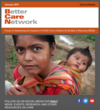This month’s issue of the BCN newsletter, published in partnership with Eurochild, provides insight into the impact of the COVID-19 pandemic on vulnerable children and families - including children in alternative care - and highlights recommendations for prioritizing children in COVID-19 recovery efforts across the globe, with a particular focus on Europe.
The COVID-19 pandemic has had a multitude of harmful impacts on the conditions and rights of children worldwide. Last year in Europe, for instance, children were more likely to be at risk of poverty with a growing number of parents no longer able to care for their family due to salary cuts, furlough or unemployment. In some countries such as Greece, Hungary, Romania and Slovakia, the number of children in alternative care increased by as much as 30%.
A combination of financial stress, uncertainty over the future, and confinement measures has had an impact on the increase of cases of children facing intra-familiar violence and mental health issues. Particularly affected were children in out-of-home care who badly missed outside contact during lockdown, notably access to school, sports and other outside facilities – and, worse still, their own families. Unfortunately, re-institutionalisation and significant delay to further transition from institutional to community-and family-based care were also recorded in several countries, putting care leavers in an even more vulnerable position than before.
Growing up in lockdown, a report by Eurochild featured in this newsletter issue, provides a unique in-depth assessment of the situation of children’s rights and conditions in 25 European countries. The report measures concrete effects of the COVID-19 pandemic on children, including, with the support of the Martin James Foundation, assessment of its impacts on children in alternative care. This issue also highlights a discussion paper produced by UNICEF and Better Care Network that elaborates on the extraordinary challenges facing children and families across the globe, and the steps that can be taken to ensure their inclusion in COVID-19 recovery plans.
“Our members on the ground have highlighted issues on the rise such as poverty (including food poverty), domestic violence, mental health issues as well as educational and digital divide. It is our duty to go beyond observations and suggest specific measures to curtail the long-term effect of the pandemic on the wellbeing of children,” Jana Hainsworth, Secretary General of Eurochild noted.
Besides concrete recommendations to improve public policies in both the short and long-term, Eurochild’s report shares good practice and lists six priority actions for the European and national levels on how to steer child-centred recovery, including maintaining, strengthening and expanding investments in deinstitutionalisation reforms. Similarly, the five-point agenda for care laid out in the BCN-UNICEF discussion paper offers a comprehensive, multisectoral roadmap to guide the immediate response to ensure quality care for children as well as the long-term investments across sectors, essential for care reform. Additional resources in this issue also point to the need for global, regional, and national COVID-19 recovery plans that safeguard child rights and support children and families who have been impacted by the crisis.
The issue will be published on 2 February 2021 at 1:00am EST

